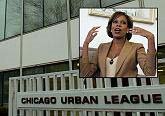
From The Chicago Sun-Times…
--------------------------------------
Are civil rights groups still relevant today?
BY MAUDLYNE IHEJIRIKA Staff Reporter
Chicago has long been a bastion for civil rights groups.
But are the Urban League, the NAACP and Rainbow /PUSH -- venerable foot soldiers in the decades-old battle for racial justice -- still relevant?
“It’s an insulting question,” the Rev. Jesse Jackson retorted. “It doesn’t reflect an analysis of what’s happening. Does voter registration matter? Does inequity in education matter? Of course it does.
“Those who ask that seek to diminish the historical significance of the relationship between protest and progress. Yes, things change,” Jackson said. “But they change because of protest. Then there is regress.”
The NAACP made headlines March 4 after the resignation of Bruce S. Gordon, its president of 19 months. Gordon and the board chaired by civil rights icon Julian Bond disagreed over his efforts to take the NAACP in a new direction. Bond had introduced Gordon with accolades in June 2005, and Gordon, at the outset, had proclaimed his goal of finding a new direction.
“It’s a family thing. Every family has its issues, and you don’t need to air it. But the NAACP is still very much relevant,” said Karl Brinson of the NAACP’s West Side chapter.
“I would have thought we would be out of business by now, but we still face the same issues. Instead of lynchings, it’s police brutality. Instead of segregated schools, it’s the quality of education …” Brinson said.
‘Crisis of divisiveness’
Confrontation used to be the weapon of choice to effect change. It was protests, press conferences and picket lines. Today, it’s negotiations and bridge-building. And when you talk to folks on the street, most feel disconnected to entities they once saw as champions.
“Civil rights organizations may not have the same profile we did 30 years ago, but that’s because, to a great extent, there’s a broader community of African-American leaders today,” said National Urban League President Marc Morial. “You have a large community of elected officials, many more nonprofit organizations, and mainstream organizations with African-American business and labor leaders. To a great extent, that was one of the objectives of civil rights.”
But to at least one observer, the apparent disconnect fuels the question of relevancy.
“We must become proactive about our own internal crisis of divisiveness; otherwise, it really doesn’t matter what the Urban League does, or the NAACP, or PUSH,” said the Rev. Hycel Taylor, professor emeritus at Garrett Theological Seminary in Evanston and a former national board president of Rainbow/PUSH. “We’re still going to be in the same predicament.”

No comments:
Post a Comment